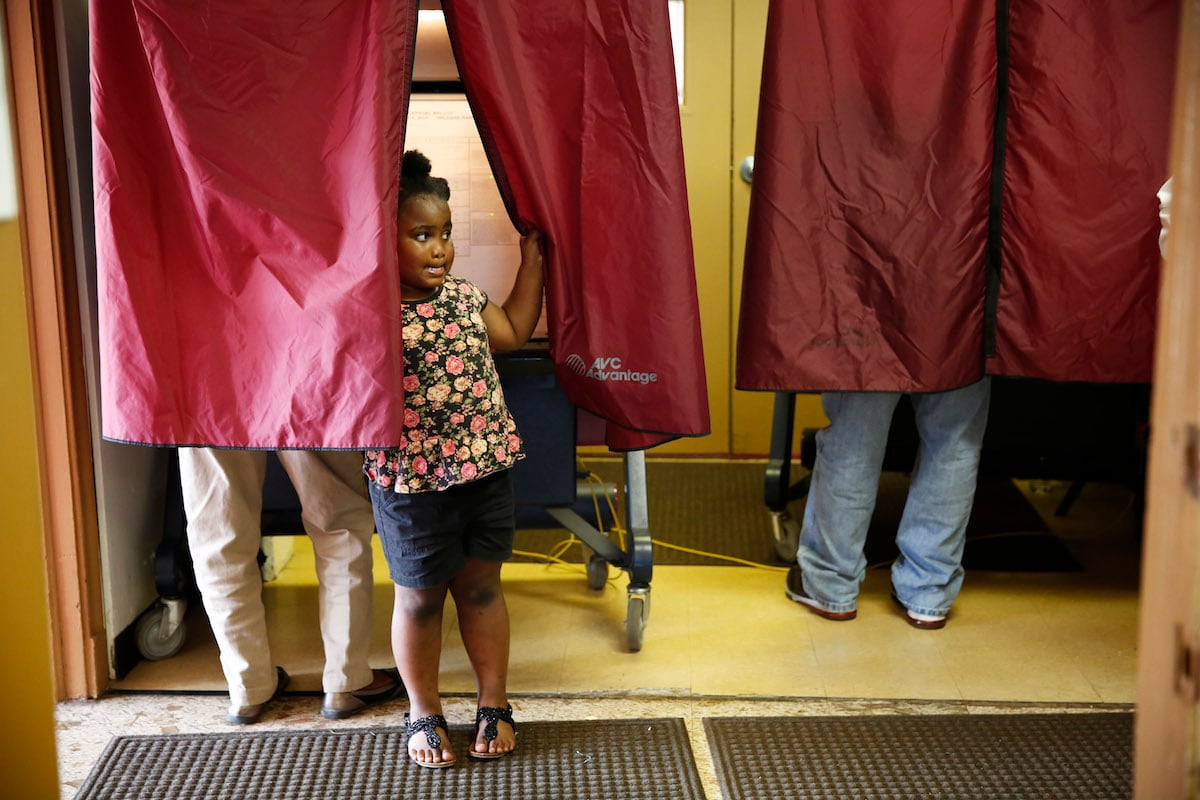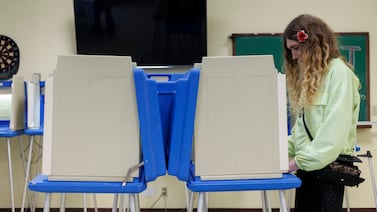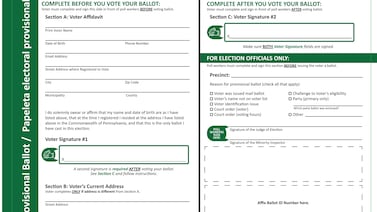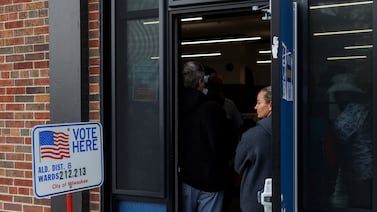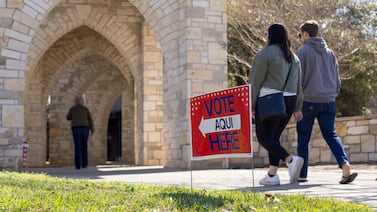A version of this post was originally distributed in Votebeat’s weekly newsletter. Sign up here.
The Heritage Foundation released a “scorecard” last week ranking states on election security. It is, as I’ll explain here, extremely flawed in both its methodology and its conclusions. It has received almost no attention, aside from fawning praise heaped upon it by conservative media. But governors of states that did well — such as Georgia Gov. Brian Kemp — have used it to spin up their credentials, since Heritage is a think tank with significant clout in conservative circles.
“Because Georgia led the way with the passage of the Election Integrity Act, @Heritage has ranked our state NO. 1 on election integrity!” Kemp tweeted the day the scorecard was released. “I’m in the fight to secure our elections - no matter what the woke mob throws our way.”
Heritage’s analysts ranked states in 12 areas, to each of which they assigned seemingly arbitrary point ranges. For example, states can receive up to 20 points for voter ID implementation, but only three points for appropriate vote-counting procedures. Confusingly, states also could receive points for not doing something. If they have never instituted automatic voter registration, for example, they receive points in the “restriction of automatic registration” category. States received point deductions across multiple categories for the same thing. For example, depending on a state’s voter ID law, it may be dinged in both the voter ID category and a category pertaining to citizenship verification.
Ranking states on election integrity is a fraught exercise, because states conduct their elections in significantly different ways. That’s why essentially no reputable organization ranks states in this manner. Instead, states are generally given a letter grade across broad categories rather than being pitted against one another. It is difficult, for example, to do an apples-to-apples comparison of a state like Colorado, which uses mailed ballots almost exclusively and has paper ballots in all cases, to a state like Louisiana, which offers very little vote-by-mail access and uses almost no paper ballots.
And, crucially, the rankings leave out important information. Although this is an “election integrity” scorecard, and the Heritage Foundation has repeatedly made significant noise over the importance of paper ballots and the importance of auditing election results (which you can only do if paper backups are in place), there is no category for those factors. Louisiana — the only state in the country that uses an entirely paperless voting system — is ranked the seventh best state in the country on this list. Texas, which has a handful of counties using DREs, ranks sixth. No category assigns points to states with mandatory audit procedures, which experts agree is among the most clearcut ways to ensure the accuracy of results. California, for example, has stronger technical requirements than federal standards and requires counties to conduct audits after every election. It is ranked 49th.
All of these things help explain why Heritage has arrived at startlingly different conclusions than other organizations that have taken a broad look at election integrity. While, for example, Colorado tends to lead the nation in election security according to organizations like the Center for Strategic and International Studies, American Progress, the Brookings Institution, and others, Heritage has ranked the state 34th. And much of its basis for the rankings of Colorado — and other states — is literally false. For example, the Heritage Foundation claims that Colorado does not check its voter list against lists of deaths or citizenship status. That’s not true, as Colorado is a member of ERIC, which checks for voter registrations of those who have died, and uses information from the Department of Motor Vehicles, which checks citizenship. Also, because Colorado is a vote-by-mail state, it is logically far better at tracking the addresses where ballots must be mailed.
States are also dinged for things that are entirely political in nature and have no relationship to integrity. For example, Heritage penalizes states that have same-day registration, even though there has never been a reputable study linking same-day registration to fraudulent votes. Heritage also penalizes states for counting ballots prior to election day, having automatic voter registration, or allowing private donations to fund election administration—none of which are proven to compromise election security. And while Heritage awards points to states that do not allow third parties to deliver ballots, they do not take into account limitations other states have placed on third-party ballot delivery to prevent untoward ballot harvesting. It is a simple yes or no checkbox, which captures no nuance.
The final list appears to be a simple ranking of who the Heritage Foundation politically prefers. All but two of the top 10 states went for Trump in 2020, and all but one of the top 10 states have Republican chief elections officials. The exception is Wisconsin, whose Board of Elections is controlled by an even split of Republicans and Democrats and whose rules were radically altered several years ago by Republican then-Gov. Scott Walker. Perhaps most tellingly, all 10 of the top 10 states have — and have long had — legislatures controlled by Republicans.
The flimsiness of this ranking was made all the more obvious when contrasted this week with the Associated Press’s in-depth analysis of actual vote fraud in the 2020 election. The AP painstakingly analyzed reports of fraud in all of the swing states contested by Trump, finding fewer than 500 potential cases — a number far too small to have swung any state’s results, much less the entire election. Reporters reached about 340 election offices to get details about every instance of potential voter fraud identified during post-election reviews and certifications. Meanwhile, the Heritage Foundation ranked states using a made-up scale with no attention to facts. Certainly, what the AP and Heritage have measured are far different, but the striking difference in care and attention given to each analysis is palpable.
We rate Heritage’s ranking zero out of 10, and award it no points for attention to detail.
Back Then
Let’s talk about Hans von Spakovsky. He’s the head voting guy at Heritage and was heavily involved in the creation of this scorecard. This is not the first time he has produced head-scratchingly-incorrect conclusions about election security. For example, in 2018, the state of Kansas paid Spakovsky $10,000 to serve as an expert witness. He testified to the supposed propensity for voter fraud in the state but was found by a judge to be unreliable. His testimony, a George W. Bush–appointed federal judge found, was “premised on several misleading and unsupported examples” and included “false assertions.” It’s also not the first time Spakovsky has gone to bat for Georgia, which is ranked No. 1 on Heritage’s scorecard. While he was part of the Bush DOJ, he led the efforts to approve Georgia’s voter ID law in 2005 under federal preclearance requirements, despite earlier having written a law review article in support of the measure, under a pseudonym. A portion of this law was overturned by a federal court. In his decision, the judge called it a “Jim Crow-era poll tax.” The decision was upheld by a three-judge panel made up of two Republican appointees and one Democratic appointee.
In Other Voting News
- There is apparently “growing momentum” for Congress’s big voting bills to be voted on before the end of the year. We’ve heard this before, and it’s hard to see how that shakes out. Not least because Arizona’s Kyrsten Sinema has made perfectly clear she does not support filibuster reform, and said so again this week.
- But her position on this doesn’t mean the pressure will lift: The family of Martin Luther King Jr. has decided to push hard for these votes and will use his upcoming holiday to make that position clear. A group of Arizona students have also joined a movement of young activists holding a hunger strike outside the White House in an effort to force movement on the bills.
- In an 8-1 decision, Texas’ highest criminal court has struck down a law that allowed the state’s attorney general to unilaterally prosecute election cases. The judges write: “the Attorney General can prosecute with the permission of the local prosecutor but cannot initiate prosecution unilaterally.” The current AG, Ken Paxton, has been aggressive in hunting down voter fraud and panned the decision on Twitter, saying it was a threat to Texas’ elections.
- Arguments kicked off in Pennsylvania Commonwealth Court this week, where Democrats have sued to block a Republican subpoena related to the Senate’s investigation of the 2020 election. The subpoena demands information about the state’s registered voters, including partial Social Security numbers and drivers license numbers, and Democrats have argued that such demands have no legitimate purpose.
- A Republican measure in Pennsylvania that would bar local election administrators from accepting outside funding has passed the House on a partisan vote and now moves to the Senate for consideration.
- New York Democrats are still reeling from their failure to pass ballot measures that would have opened up absentee voting and same day voter registration. Democrats say they will reintroduce them, and say they’ll dedicate more effort to encouraging turnout.
- Time has a compelling profile of the Antrim County, Michigan, election administrator who unwittingly became the focus of intense rightwing conspiracy theories. Sheryl Guy, the local administrator, was responsible for the error on election night that inadvertently shifted around 2,000 Trump votes to Biden. The far right seized on the anomaly as proof of a massive conspiracy to manipulate Dominion Voting machines. “The days that followed were a blur of meetings and calls with county attorneys and software programmers, and through the haze, a thought gradually dawned in Guy’s mind: I did this. It’s my fault.”
- Ballot design confusion strikes again: John O. Jacoby Jr. won reelection this week in a Lewiston Town Board in New York, after a court finally ordered the recounting of 43 ballots of voters who filled in the “O” in his name instead of the bubble next to it. “A lot of my constituents are like me. They’re old. I’m 78,” Jacoby said. “People don’t wear their glasses and these things can happen.” An 18-vote loss has now turned into a 25-vote win.
- Wake County, North Carolina, has put out an excellent video explaining how elections are conducted. It walks voters through the nitty gritty of the process — chain of custody, security, vote counting. This is a great way to provide a look under the hood for voters, who tend to mistrust the process because they don’t understand it.
Good News of the Week
A bill in Maine would tighten chain of custody requirements around ballots and machines, potentially preventing the type of “the threat is coming from inside the house” situations now faced by two states. Yes, nothing of the type has ever happened in Maine, says State Rep. Teresa Pierce, a Falmouth Democrat, but that was once true of Colorado, too. “Could we tighten it up? Could we make it a little stronger, just to make sure? I’m sure people in Colorado never thought anything would happen in Colorado, right?” she said to Maine Public.
Collier County, Florida, has announced the two winners of its “Art for Democracy” contest! They are Leslie Wu, an eighth-grader at Gulfview Middle School, and Christopher Epperson, a ninth-grader at Lely High School. The art will be used in county election materials, such as “I Voted” stickers, and are a great way to encourage community involvement and get youth excited about elections. More of this, please!

